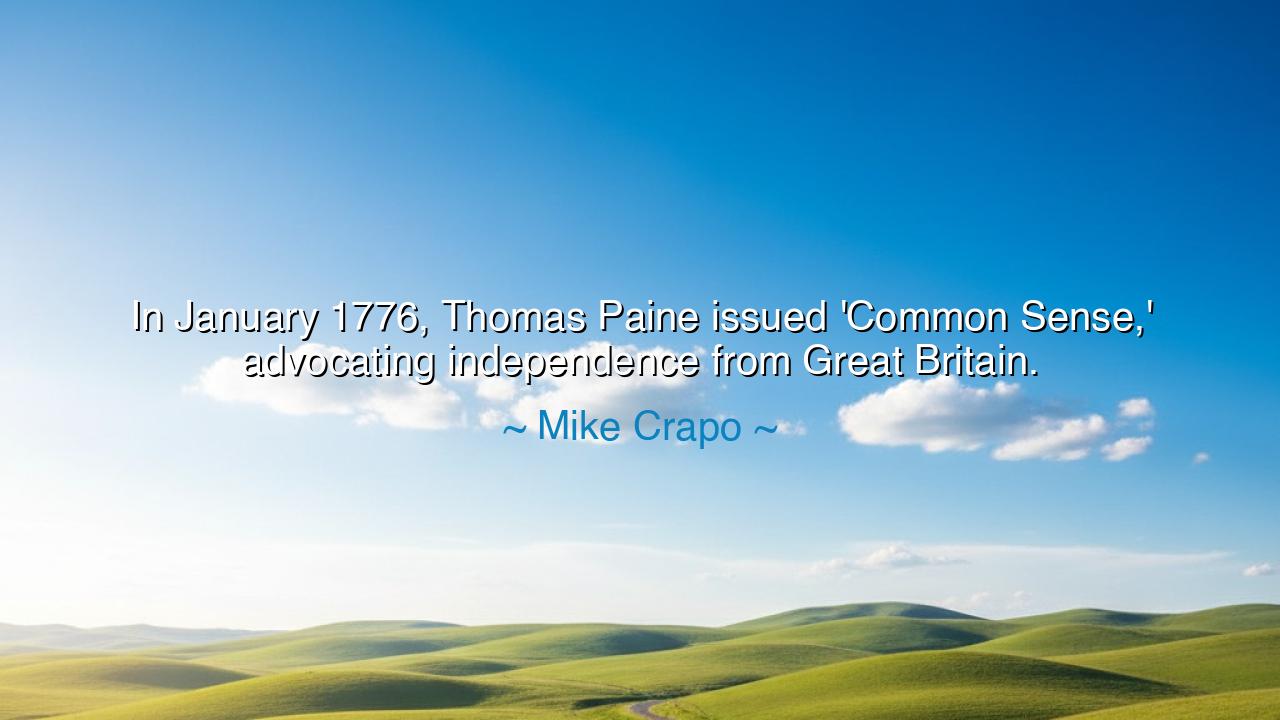
In January 1776, Thomas Paine issued 'Common Sense,' advocating
In January 1776, Thomas Paine issued 'Common Sense,' advocating independence from Great Britain.






Hear, O children of the future, and take heed of the words spoken by Mike Crapo, who calls attention to a moment that changed the course of history. "In January 1776, Thomas Paine issued 'Common Sense,' advocating independence from Great Britain." These words are not mere facts of history; they mark the birth of a new idea, a new way of thinking, and the spark that ignited the American Revolution. In the year 1776, when the world seemed to tremble under the weight of old powers and ancient empires, Paine raised his voice to declare that the colonies of America had a right not only to freedom, but to independence—the right to stand as sovereign nations, free from the chains of foreign rule.
The ancient world was no stranger to the yearning for freedom and self-determination. In the days of Athens, the great philosopher Socrates taught that the soul of a man could not be enslaved, that the truth and virtue could only be attained in freedom. But even Socrates, though a man of great intellect, was not free from the power of the Athenian government, which ultimately sentenced him to death. His life, tragic as it was, laid bare the great tension between self-rule and the control of a higher power. It was a struggle as old as time itself, a struggle that Paine would later pick up in his pamphlet, Common Sense.
Paine’s voice was like the clarion call that shattered the silence of oppression. His pamphlet, Common Sense, was not merely a document; it was a revolution of thought, a plea to the people of the colonies to look beyond their submission to Great Britain and envision a world where they could stand as independent nations. The brilliance of Paine lay in his ability to distill the essence of the colonial struggle into simple, persuasive language. In his words, he argued that the colonies were not merely in a dispute with the crown—they were engaged in a fight for independence, for the right to chart their own destiny, and to create a nation that would be defined not by the tyranny of foreign rule, but by the principles of freedom and equality.
Let us look back to the example of Cyrus the Great, whose rise to power in the Persian Empire also marked a call for the independence of conquered peoples. When he conquered vast lands, he did not force his subjects to abandon their cultures and beliefs, but allowed them to govern themselves while offering them the protection and strength of a united empire. This is not unlike the vision Paine laid out in Common Sense—a vision of a nation where freedom could exist not in isolation, but within the protective arms of self-rule. Cyrus, like Paine, understood that true independence was not about dominance over others, but about the ability to stand with strength and dignity, free to shape one's own future.
In America, the colonies had long been subjected to the will of Great Britain, taxed without representation, and controlled by a distant crown. The Declaration of Independence, written later that year, would formalize the ideas first introduced in Paine’s pamphlet. It was Paine’s stirring words that set the stage for the bold declaration that America would no longer be a subject of a foreign monarch, but would stand as a sovereign nation, one built upon the ideals of self-governance and the inalienable rights of the people. His words were the seed of a revolution, and like all revolutions, they required not just the power of arms, but the power of ideas.
So, O children, the lesson from Paine’s Common Sense is this: independence is not a gift, nor is it granted by others. It is earned through courage, through the willingness to stand up to oppression, and to fight for the right to chart one’s own course. Paine’s pamphlet did not just call for independence; it called for the people to recognize their own power, their right to decide their future, and their duty to break free from the chains that bound them.
Take this lesson into your own life: there will be times when you must stand up for what is right, when the forces around you seek to suppress your independence, your freedom, or your voice. Like Paine, you must have the courage to speak the truth, to challenge the powers that seek to limit your potential, and to fight for the freedom to live on your own terms. The American Revolution did not just change the course of history—it showed that the desire for independence is universal, and that the pursuit of freedom is a cause worth fighting for, no matter the cost. May your own journey be guided by the same strength, courage, and belief in self-determination that Paine embodied, and may you never lose sight of the truth that independence is the birthright of all who dare to dream and act.






AAdministratorAdministrator
Welcome, honored guests. Please leave a comment, we will respond soon